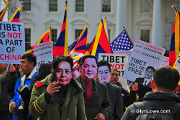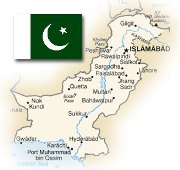Ministry of Intelligence issues halt to services, which attracted converts.
ISTANBUL, February 17 (CDN) — Iran’s Ministry of Intelligence has ordered the last two officially registered churches holding Friday Farsi-language services in Tehran to discontinue them.Emmanuel Protestant Church and St. Peter’s Evangelical Church were the last two official churches offering Farsi-language services on Fridays in Tehran, according to Middle East Concern (MEC). Officials issued the order on Feb. 10
Authorities had ordered the Central Church of Tehran to close its Friday Farsi services in December 2009. The Central Church, an Assemblies of God (AOG) congregation, had conducted multiple services on Fridays.
Friday services in Tehran attracted the city’s converts to Christianity as well as Muslims interested in Christianity, as Friday is most Iranians’ day off during the week. Authorities told the churches they can hold the services on Sunday, a working day when most Iranians are not able to attend.
“This decision means that there are now no Farsi-language services on Fridays in any officially registered church in Tehran,” an MEC report issued this week stated.
Emmanuel and St. Peter’s are Presbyterian churches, and, along with the Central Church, are among Tehran’s few registered churches. They exist mainly to serve the Armenian and Assyrian communities. The three churches’ Armenian- and Assyrian- language services are typically held on Sundays.
Because these churches belong to minority groups, government officials cannot stop them from operating but are doing what they can to limit them and the spread of Christianity to Farsi speakers, an Iranian Christian who requested anonymity told Compass.
“Authorities want church operations to stop, but because these churches are established by Armenians and Assyrians and their leaders are Armenian and Assyrian, they can’t stop them,” the source said, “but they can stop the Farsi-speaking services.”
The source said that the newest restrictions have cut the two churches’ attendance by half.
The MEC report stated that “the order to stop Farsi services is consistent with the authorities’ policy of restricting Christian activities to these traditional communities,” indicating that Tehran is determined to eradicate access to Christian worship for the country’s growing number of Christian converts.
Authorities have prohibited musical worship and Bible distribution at the Central Church of Tehran, the largest and most visible AOG church in the country. Last December officials enforced a policy under which only invited guests could attend a Christmas service at the church.
The Iranian Christian said authorities recently have pressured leaders of Emmanuel and St. Peter’s churches to turn over to officials the national identity numbers of Christians. As a result, many Christians from these churches, as well as the Central Church of Tehran, have lost their jobs.
“We have some people who were fired from their jobs,” the Christian said. “The authorities pushed the bosses to fire their Christian employees.”
The source explained that this is a new tactic by the government to discourage Iranians from becoming Christians and to deter Christians from being involved in church.
“If I have too many difficulties in my life, I won’t have time to be involved in church, and people will see how difficult it is to be a Christian,” the source said. “This is not a good face for the Christians. The others see and say, ‘Oh, they became Christians and God stopped His blessing to them.’”
Most Iranian Christian converts attend underground house churches that belong to various networks. For their own protection, these Christians often do not know about other house church networks.
Authorities often detain, question and apply pressure on converts from Islam, viewing them as elements of Western propaganda set against the Iranian regime; as a result, the converts are forced to worship in secret.
This week news surfaced of the arrest in Tehran of an AOG leader, Masis Moussian of the Narmak AOG church. Mohabat News reported that his arrest was a result of “waves of anti-Christian pressures and distribution of unsubstantiated reports by regime-supported media regarding the AOG churches of Iran.” According to these reports, members of the AOG church in Tehran are “extreme Christians” trying to recruit new members and particularly youth across the country.
Moussian is held at the Rajaei-Shahr prison and is not allowed visitors. His family has not been able to obtain information on his condition in prison.
On Feb. 8 authorities also arrested about 10 Christians who had gathered for worship at a house in the southern city of Shiraz. A new report by Mohabat News revealed that authorities mistreated the Christians in attendance and searched the house, confiscating Bibles. The Christians still remain in an unknown location.
The new report identified two women, three men and a teenager by their first names. Another was identified as Mojtaba Hosseini. Authorities had also arrested Hosseini in 2008, along with eight other Christian converts, on charges of being Christians, according to Mohabat.
Among those arrested last week was a 17-year-old boy named Nima, along with his mother, Fariba, and father, Homayoun. Another woman was identified as Sharifeh, and two men were identified as Kourosh and Masoud. Authorities searched the homes of those arrested and seized CDs, Bibles, Christian materials, computers, fax machines and satellite receivers, according to Mohabat.
Iran applies sharia (Islamic law), which dictates that converts from Islam to other religions are “apostates” and thus punishable by death. Although judges rarely sentence Christians to death for leaving Islam, one Christian, Yousef (also spelled Youcef) Nadarkhani, is appealing such a decision in the northeastern city of Rasht.
Nadarkhani has been in prison since October 2009. A Rasht court found him guilty of leaving Islam and handed him the death sentence in September 2010. Remaining in prison also are Farshid Fathi in Tehran; Farhad Sabokroh, Naser Zamen-Defzuli, Davoud Alijani and Noorollah Qabitizade in Ahwaz; and Fariborz Arazm and Behnam Irani in Karaj.
There are an estimated 350,000 Christian converts from Islam in Iran.
“I believe 100 percent the whole movement in Iran is in God’s hand,” the source said. “This pushing [of the government] can stop the church buildings, but they cannot stop the Kingdom of God.”
END





.jpg)
.jpg)













